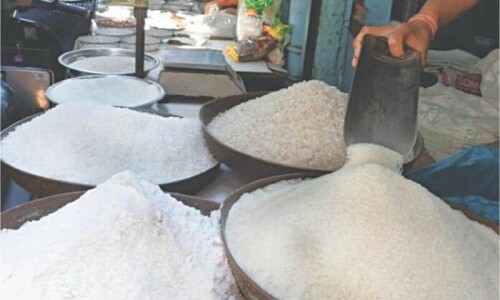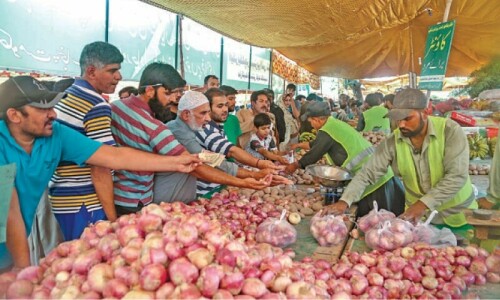
In every kitchen, there is a special recipe for pakoras — one perfected over time, passed down through generations, and adapted to individual tastes.
Yet, at its core, the price of a batch of pakoras boils down to just the basics: a kilogram of pulse gram (taken as a proxy for besan), a kilogram of onions, and a kilogram of potatoes.
The chatpatta mix of spices and the vat of oil (which, in true household efficiency, later fries the samosas) have been omitted for this conservative estimate since 2013.
Assuming a price of Rs250 for half a kilo of pakoras consumed daily, it amounts to Rs7,500 for the month or roughly 20pc of the minimum wage, making even the humble Ramazan staple, a luxury.
For years, the price of pakoras crept upward, increasing only marginally each year. Then came the recent macroeconomic crisis. The commodity price shocks triggered by the Russia-Ukraine war sent inflation soaring worldwide, pushing Pakistan to the brink of default. That turmoil made Ramazan staples — including the humble pakora — pricier as well. So, in a roundabout way, we can thank Putin for pricier Iftar platters.
However, compared to 2024, the price of a batch of pakoras has now dropped by roughly 20pc. This is in part because inflation has dropped to the lowest in nearly a decade, which edged the price of gram pulse down.
Nevertheless, this decline is largely driven by seasonal fluctuations in onion and potato prices. Unlike tomatoes, which perish quickly and experience extreme price swings, onions and potatoes have longer shelf lives and better storage options, keeping their prices relatively stable.
In the lead-up to Ramazan, onion prices fell to around Rs100 per kg — a significant drop from the Rs180-230 per kg range in February last year —thanks to a strong crop in Sindh. Surplus onion crops allowed for exports while prices at home remained stabilised.
Just a couple of weeks ahead of Ramazan, tomato prices crashed owing to a bumper crop with 5kg of the fruit (yes, it is a fruit, not a vegetable) being offered at Rs100 at some localities in Karachi.
Media reports suggest that Karachi’s Commissioner has released an official list and set prices for popular Ramazan snacks, including pakoras, to prevent overpricing. A-class pakora are to be sold at Rs600 per kg and B-class pakora price is set at Rs500.
Regardless of the prices, the fried staple will remain a core memory of Ramazan for all generations and an indulgence for the lower socio-economic strates.
Published in Dawn, The Business and Finance Weekly, March 10th, 2025













































